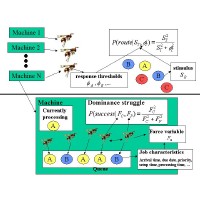In many domains, there is a need for computational frameworks and mechanisms that support dynamic coordination of multiple agents toward achievement of specific global objectives over time. Quite often, the problem at hand centers on allocation of the resources that each agent has at its disposal. For example, different manufacturers along a supply chain have different production capacities and constraints which must be synchronized over time; various commands in a military operation must coordinate and time share the use of their assets; execution of common business processes requires staged participation of personnel in various organizational units.
To better understand and address such multi-agent coordination problems, we are investigating the following issues: (1) Coordination protocols and policies, (2) Use of projection and look-ahead, and (3) Adaptive decision policies.
Our current research in this direction has been focusing on the development of self-scheduling systems that draw on various aspects of a computational model of the self-organizing behavior of wasp colonies. More specifically, we have been developing the following such self-scheduling systems and algorithms:
- The first of these systems utilizes wasp-like agents, which we call “routing wasps”, that use adaptive decision policies for the assignment of jobs to multi-purpose machines faced with sequence-dependent setup constraints. This system exhibits superior performance to a “real-world proven” multi-agent system for vehicle paintshop scheduling problems.
- We are also developing a stochastic search framework based on the self-organization of dominance hierarchies among wasps in nature. This framework, which we call Wasp beHavior-Inspired STochastic sampLING (WHISTLING), provides a general approach to heuristic-guided stochastic search that utilizes the full potential of the discriminating power of the heuristic for the problem at hand. Underlying WHISTLING is a population of what we call “scheduling wasps” that interact to prioritize the queue of jobs and to search a stochastic neighborhood of the scheduling heuristic.


